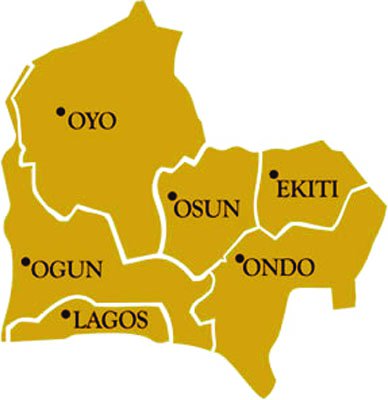A socio-political organization, Yoruba Referendum Committee (Agbajoowo la fi n soya), on Sunday, called on the Lagos, Ogun, Oyo, Osun, Ondo, and Ekiti States’ Houses of Assembly to pass into Law, the Bill for a Referendum, which has already been sent to them, twice, for action, saying that the 1999 Constitution shaved the peoples’ heads in their absence.
It urged the Houses of Assembly to rise to the occasion, especially as the demand is supported by a growing number of Yoruba who have signed the petition to that effect.
In a statement by Messrs Femi Odedeyi and Shenge Rahman, the Committee noted that current suggestions by notable Yoruba individuals and organisations, advocating for a Government of National Unity or an Interim Government, “are direct means of subverting the legitimate quest for true federalism in Nigeria. It went further to argue that such a move denies the sacrosanct of the people in whom power resides but tends to arrogate power and authority to the leadership. Being the creator of the problem in the first instance, such leadership cannot be the solution.”
Emphasizing that it is not calling for the cancellation or boycott of the 2023 elections, the Committee recalled that in 1960, “when the idea of a Government of National Unity was proposed by the Northern Peoples’ Congress, the Action Group rejected it on the ground that such a coalition government was not feasible between two political parties of vastly divergent political philosophies. It added that the Interim Government of 1993 was instituted as a half-measure to address the crisis emanating from the annulment of the June 12, 1993 elections. Because of its shaky foundation, it did not take long for the military that set it up to torpedo it.”
The statement reads: “There is no evidence till date that the political upheaval or crisis engendered by the June 12 annulment has disappeared to warrant such calls. Instead of the said crisis abating, problems of structure and power relation in the country are getting worse by the day.”
The group then maintained that the option before the Yoruba “is to organize a referendum within Yorubaland to decide the framework for their aspirations and self -actualisation while also advocating a similar template for other Peoples of Nigeria to facilitate the federalization of the country of the country.
“In advancing this course of action, the group noted that the only period of social and economic development experienced in Nigeria was during the Federal and Regional administrations, attested to by the references to the Western Region as our Golden Era by the Yoruba, and lately, the Buhari Administration’s recourse to showcasing its economic achievements via the rice pyramid – an admission of the developments in the then Northern Region as exemplified by the groundnut pyramids”.
The group further stated that despite the limitations of that period, the Western Region between 1951 and 1959 under Chief Obafemi Awolowo, was and is still recognized as the golden era which the 1960 Independence Act and the 1963 Constitution attempted to later neutralize by the virtue of their pernicious provisions.
“Thus, the said two constitutions cannot be a foundation to build on. Instead, a new constitution that takes care of our aspirations must be fashioned out anew.
“It is, therefore, necessary to create a roadmap towards creating the political, economic and cultural atmosphere that will ensure continuous and unfettered development as envisaged and pursued by the then Western Region, as a Categorical Imperative which we hereby dub as Yoruba referendum.
“Furthermore, to avoid the huge expenses associated with every electoral cycle, the Federal Republic of Nigeria must be anchored on a valid Federal Constitution, with a Federal Presidential Council, whose members will be selected or elected from each of the Nationalities as Federating Units and from whom a Head of State will be selected or elected as the primus-inter-pares with an agreed term. This will make the need for country-wide campaigns by a candidate unnecessary thus cutting off avoidable expenses. Such will also compel the aspirant or candidate to concentrate on the real needs and aspirations of the People he or she is representing.”
While reiterating that it is not opposed to the planned 2023 elections, the Yoruba Referendum Committee said that it noted the spirited efforts of all Yoruba politicians who have declared their intention to contest for the Presidency and urged them to anchor their aspirations on not only good governance for Nigeria, but also on ensuring that the Yoruba Nation and Nigeria as a whole are “rescued from the continuous cycles of underdevelopment”, it stated.
The group contended that given the “historical political reality of Nigeria, it was clear that what is today regarded as ‘our Golden Era’ occurred when we were practising Parliamentary System of government. It advocated a return to that system of government which ensured less monetization of electoral politics as there was no need for even a Region-wide canvass for votes to become the Premier. This is sharp contrast to what obtains today, under Presidential System, in which Gubernatorial and Presidential Elections costs a colossal amount of money which keep increasing at every electoral cycle.”
The Yoruba Referendum Committee insisted that what it is “advocating now can be achieved without having to postpone it till when successors of those in power currently come take over. It called on those in the corridors of power now to make this Referendum a priority as it represents the collective aspirations of the people. Those being called upon included Governors, Speakers, Legislators, Presidential hopefuls and other aspirants into various political offices in the land. Community, religious and opinion leaders are also called upon to ensure that this initiative come into reality to avoid being seen as part of the conspiracy against the re-establishment of the Peoples’ ownership of the apparatus of their own governance.”




